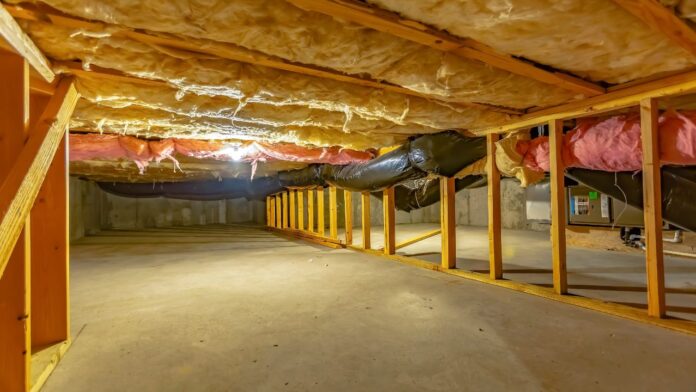You can use the crawl space underneath the house to access the house’s foundation, plumbing, and electrical systems. Crawl spaces are typically created to be tall enough for a human to crawl through, thus the name. They are often vented to allow for airflow and moisture management.
Keeping your crawl area as dry and clean as possible is critical because up to 50% of the air we breathe in our home may come from there. Your property risks water damage from mold, wood rot, pest infestations, and lower energy efficiency since even vented subterranean spaces can contain moisture. Keep excess moisture out of your home because it can lead to several undesirable issues.
This is where crawl space encapsulation comes in. It can help you keep moisture out of your home. So, what is crawl space encapsulation, and why and when should you have it done? Let’s find out.
What is crawl space encapsulation?
Encapsulation entails covering the interior and exterior walls of the crawl space with insulation and moisture barriers to reduce humidity. A drainage system or dehumidifier might also need to be installed. Essentially, you’re waterproofing the area to safeguard the home’s foundation. The air quality within a home can be enhanced by fixing moisture issues in crawl spaces.
Why you should encapsulate your crawl space
- It improves indoor air quality
You breathe air from your crawl space through ducts, fissures, and other holes, even though it may not appear like it. By blocking mold, pollen, pollution, and other toxins from entering your house, encapsulation helps to enhance indoor air quality so you may breathe quality indoor air.
- It prevents moisture
Numerous issues will arise from moisture seeping into your crawl area. Moisture can affect the strength of your home’s joists, beams, and foundation if it isn’t controlled.
Due to moisture, your wooden floor joists and beams will eventually expand and bend. The wood will decay as fungus, mold, and mildew grow due to this moisture. Wood-rotted components must be replaced, which may be costly and time-consuming.
The concrete of your foundation may shift and break as moisture seeps into your crawl space. To maintain low moisture levels and avoid these issues, pair with a dehumidifier.
- It eliminates insect infestation.
Termites and other insects need moisture to thrive. If you encapsulate your crawl spaces, it will prevent the likelihood of nurturing conditions that attract pests like termites. By handling your crawl space needs with expert encapsulation, you can eliminate the risk of bug infestation, major damage, and the issues pests cause.
- Prevents structural damage
It’s critical to keep moisture from building up in your crawl space for the long-term stability of your home’s foundation. When you keep moisture out of your crawl space, you also keep it out of the soil surrounding your house’s foundation. Gutters direct water away from the base of your house, but a damp crawl area can be problematic. Encapsulating the crawl area improves the stability of your foundation for many years by preventing moisture buildup.
- It prevents mold and mildew.
Crawl spaces that lack ventilation can become damp. Mold, mildew, and fungus will grow as this moisture concentration increases.
Mildew has an unpleasant stench that might enter your home. The air quality in your home will be impacted by mold and fungus, which can have a major negative impact on your health. Mold, mildew, and fungus won’t be able to develop in your house if you encapsulate your crawl space.
- Boosts energy efficiency
When your HVAC system doesn’t have to work as hard to combat the damp air produced by a moist crawl space, it uses less energy, lowering your monthly electricity costs. Due to the improved energy efficiency, it gives your home, crawl space encapsulation pays for itself over time.
- Decrease the radon levels.
A hazardous, radioactive gas called radon is frequently present in crawl spaces and basements. Reduce radon levels in your home and eliminate any associated health problems by enclosing your crawl space with a radon membrane.
When should you encapsulate the crawl space?
There is no perfect time to encapsulate a crawl space. You should always encapsulate it. But if you live in an area prone to floods or frequently deal with bulk water problems, then it is vital to encapsulate your crawl space.








